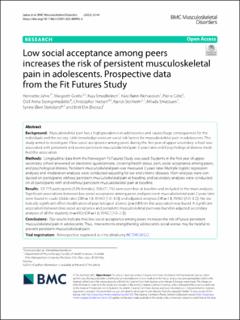Low social acceptance among peers increases the risk of persistent musculoskeletal pain in adolescents: Prospective data from the Fit Futures Study
Jahre, Henriette; Grotle, Margreth; Smedbråten, Kaja; Richardsen, Kåre Rønn; Côté, Pierre; Steingrímsdóttir, Ólöf Anna; Nielsen, Christopher Sivert; Storheim, Kjersti; Småstuen, Milada Cvancarova; Stensland, Synne; Øiestad, Britt Elin
Peer reviewed, Journal article
Published version
Permanent lenke
https://hdl.handle.net/11250/2987990Utgivelsesdato
2022Metadata
Vis full innførselSamlinger
Sammendrag
Musculoskeletal pain has a high prevalence in adolescence and causes huge consequences for the individuals and the society. Little knowledge exists on social risk factors for musculoskeletal pain in adolescents. This study aimed to investigate if low social acceptance among peers during the frst year of upper secondary school was associated with persistent and severe persistent musculoskeletal pain 2 years later and if psychological distress modifed this association. Methods: Longitudinal data from the Norwegian Fit Futures Study was used. Students in the frst year of upper secondary school answered an electronic questionnaire, covering health status, pain, social acceptance among peers, and psychological distress. Persistent musculoskeletal pain was measured 2 years later. Multiple logistic regression analyses and moderation analyses were conducted adjusting for sex and chronic diseases. Main analyses were conducted on participants without persistent musculoskeletal pain at baseline, and secondary analyses were conducted on all participants with and without persistent musculoskeletal pain at baseline. Results: Of 775 participants (52% females), 556 (71.7%) were pain-free at baseline and included in the main analyses. Signifcant associations between low social acceptance among peers and persistent musculoskeletal pain 2 years later were found in crude (Odds ratio (OR)=1.8, 95%CI [1.0–3.1]) and adjusted analyses (OR=1.8, 95%CI [1.0–3.2]). No statistically signifcant efect modifcation of psychological distress (p=0.89) on this association was found. A signifcant association between low social acceptance and persistent musculoskeletal pain was found in adjusted secondary analyses of all the students (n=692) (OR=1.6, 95%CI [1.0–2.3]). Conclusions: Our results indicate that low social acceptance among peers increases the risk of future persistent musculoskeletal pain in adolescents. Thus, interventions strengthening adolescent’s social arenas may be helpful to prevent persistent musculoskeletal pain. Trial registration: Retrospective registered at clinicaltrials.org NCT04526522.

